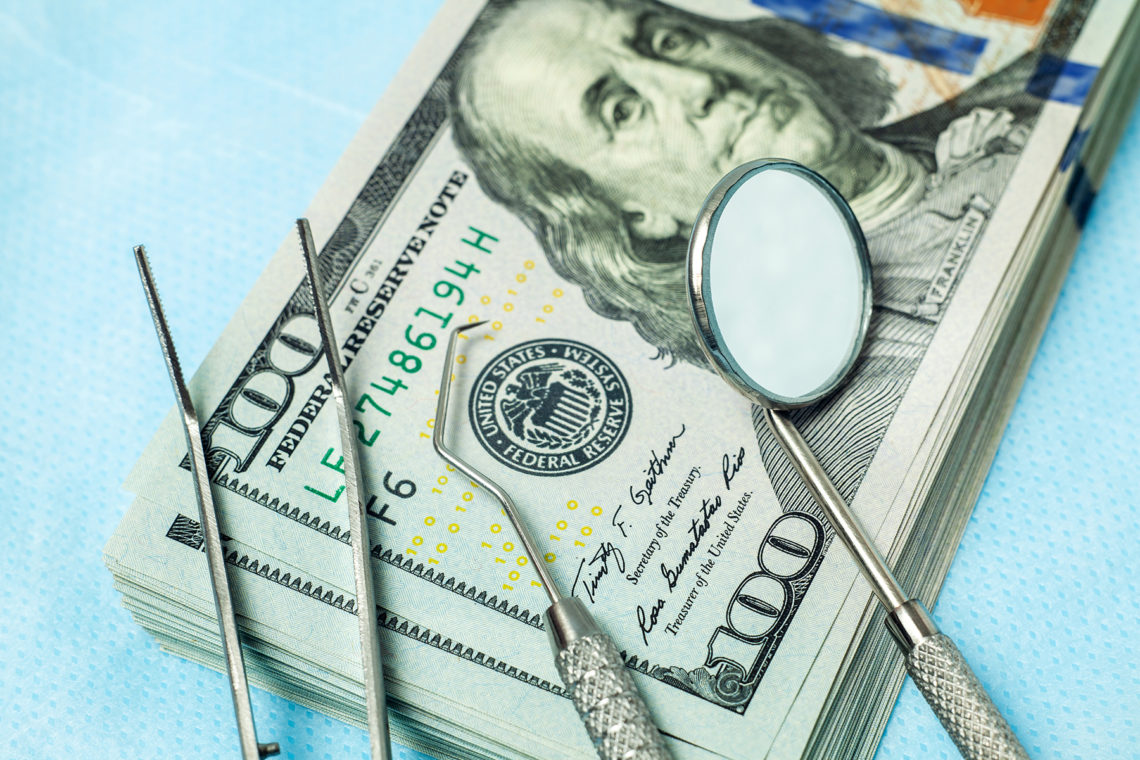
e-Newsletter
Vielen Dank,
wir haben Dir eine E-Mail an gesendet. Bitte bestätige diese.

There are as many reasons to go into dentistry as there are dentists. However, it’s safe to say that most of us have at least a little interest in the money—especially with school loans to pay off!
So, what kind of salary can you expect to make in your new career? Like every profession, it depends on several factors, including experience, location, practice type, and specialization.
The Averages
Given all the variables at play, the annual salary range for all dentists in the United States is quite wide, spanning from as low as $75,000 to more than $200,000. In 2021, the Bureau of Labor Statistics (BLS) estimated the average annual dentist salary at around $167,000. These numbers put dentistry among the highest-paying professions in the U.S., and with continued growth projected in the number of dental jobs nationwide, dental salaries are expected to rise. Good news, right?
Data on the average starting salary for new dentists is less available, but Payscale puts it at about $120,000. Again, however, the amount offered to you as a graduate will be influenced by where you want to practice, what kind of dentistry you pursue, and your negotiation skills.
The Variables
Location, Location, Location
Location is one of the biggest determinants of salary, both by state and by city. For example, in 2020, the average annual salary for dentists in Florida was $180,000, yet the city of North Port, FL, ranked second-highest in the nation at almost $279,000. Some reasons for the differences in income between states include supply and demand—fewer dentists in an area may help boost salaries—as well as the local cost of living and state laws governing income tax.
Practice Type and Specialty
Another significant driver of dental income is specialty. Many specialties bring with them higher salaries (as well as the need for extra training and its associated costs, of course). In 2021, dental anesthesiologists made the most money at an average of $278,000 per year, while orthodontists made $238,000, and pediatric dentists and endodontists both made $195,000.
The type of practice also has an effect. Although you might expect dentists in the private sector to earn more than those in government jobs, BLS data from 2021 showed otherwise, with the average government dentist salary coming in at $183,000. Dentists working in outpatient care settings and physician’s offices tended to make less than the overall average—about $160,000. And it may be worth noting that PayScale showed the average annual salary of dentists employed by one of the major DSOs to be reported at $143,000 in 2022, while self-employed dentists reported an average salary of almost $240,000.
Unfortunately, data shows that other influential factors in determining salaries include gender and race. For example, the “gender gap” in wages has female dentists consistently earning 33% to 40% less than their male counterparts, and a 2022 study of personal annual income in 2018 found that Black, Asian, and Hispanic dentists all made less money than their white male colleagues.
Type of Compensation
How your salary is calculated is yet another wrinkle to consider. While you may be offered a flat hourly rate or set annual salary, associate dentists are often paid a percentage of their production—or the actual money collected for their work, which is typically lower. A sample calculation can be seen here. Because insurance affects collections, it is important to establish, for example, what proportion of your patients will be managed care vs fee-for-service.

The Negotiation
Negotiation, then, can be a powerful tool in determining your income. Even if you are a brand-new graduate going on your first interview, you are not bound to accept the first offer you get if you feel it does not reflect your worth. Think realistically about what value you bring to the practice as a new employee and what strengths you possess, and be prepared to present them as part of the discussion.
Doing some homework into income statistics for the area, either online or through personal contacts, can also help prepare you for what kind of offer you might reasonably expect and what counteroffer you might want to make, if needed. Keep in mind that future raises will be based on your starting salary, so negotiating up front can have a significant effect on your earnings in the long run. If an increase in dollars isn’t on the table, perhaps extra vacation days, paid training courses, or other benefits are options.
Speaking of benefits, they are definitely worth something! If you are considering working as an independent contractor for someone else (rather than owning your own practice), be sure to investigate the extra costs that may be involved, such as paying for your own health insurance, retirement savings, and Social Security. A salary that seems lower but comes with employer-paid benefits may actually be more lucrative.
The Future
According to U.S. News and World Report, “dentist” ranked as the 11th best-paying job in the United States in 2022, behind several other healthcare careers such as anesthesiologist, surgeon, and pediatrician (and orthodontist, for the record). Meanwhile, the median annual wage for all occupations was about $46,000. So even right out of dental school, you will be headed for the top of the earnings class...and on your way to a bright future!







